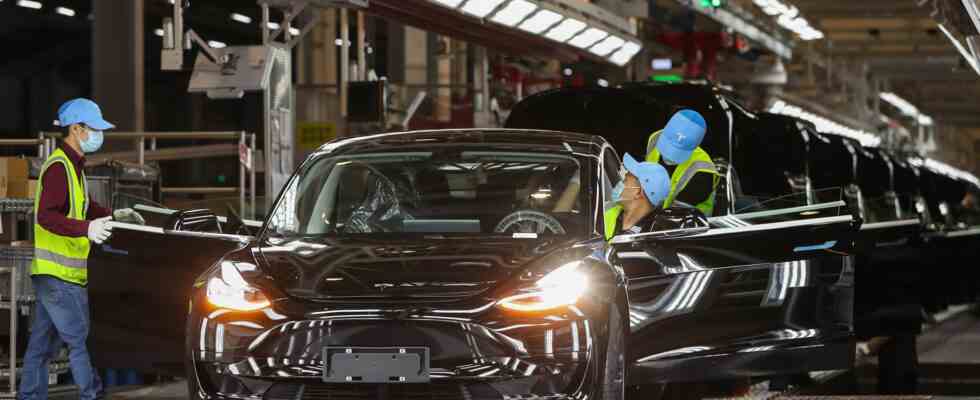As of: 01/10/2023 6:06 p.m
Prams, smartphones, medicines: many everyday products come from China. This dependency is dangerous where it is not immediately recognizable, such as research by the ARD magazine report Munich show.
Christian Stumpf is the chief physician in cardiology at the Bayreuth Clinic – and lately he has always been engrossed in business news. Because the current delivery problems with goods from China worry him. Especially with regard to the supply of medicines: It is enough that a plant in China fails, and it can happen that you can no longer get a “normal antibiotic”.
In fact, almost 80 percent of the active ingredients for antibiotics in the EU come from China. But also many of the items he needs for operations: syringes, ventilation tubes, heart catheters. An addiction that can take revenge?
Dependencies could become weapons
There are politicians who take a critical view of this economic dependency. Just like the Green MEP Reinhard Bütikofer. He is no longer allowed to travel to China – the country has sanctioned him, presumably because he regularly criticizes the human rights situation in the country.
Reinhard Bütikofer says that as long as nothing happens, relations with China are completely harmless. “These dependencies become dangerous the moment the leadership in Beijing takes the view that they should make weapons out of these dependencies.” A question that – according to Bütikofer – is currently being asked by many experts and politicians: What “would happen if China attacked Taiwan just as brutally and aggressively as Putin attacked Ukraine?”
Energy transition “Made in China”
Dependence on China is particularly great where it is not apparent at first glance. China dominates the production of important raw materials, such as the so-called rare earths. According to the EU Commission, more than 98 percent of these metals came from China in 2020 – so the EU Commission has put rare earths on the list of critical raw materials.
These substances are found in televisions, mobile phones and computers. But also in wind turbines and electric cars. The energy transition would be unthinkable without rare earths.
USA wants to end dependency
From the point of view of the raw materials expert Daniel Goldmann, it was convenient for Europe to leave the production of rare earths to China for a long time, also because toxic waste water is produced when the metals are extracted. The consequence: Today, Germany is more or less completely dependent on China for “rare earths, but also for many other raw materials,” says the Vice President of Clausthal University of Technology.
The US has already taken steps to break free of this dependence on China. After the United States had no own production of rare earths until 2017, this has been massively expanded since 2018.
Clear strategy of the Chinese
The partially one-sided dependency on China is also the subject of an internal document from the Federal Ministry of Economics from November 2022 ARD political magazine report Munich present. In these “internal China policy guidelines,” government officials point out that China’s strategy is specifically aimed at becoming so dominant as a supplier that dependencies arise.
No surprise for the Green politician Reinhard Bütikofer: “It’s not a secret science, you don’t need the CIA or the Federal Intelligence Service to find out about this strategy. That’s what they say publicly.”
For example, in a speech by President Xi Jinping in April 2020, according to which China should make international production chains more dependent in order to strengthen the “potential deterrent” against other nations.
“Germany can be blackmailed in the event of a conflict”
In the event that there should be an open conflict over the island of Taiwan, the officials from the Federal Ministry of Economics apparently also fear the consequences for Germany: “The great importance of China as a sales market for a number of German industrial sectors as well as critical dependencies in certain economic or technological areas […] can make Germany vulnerable to blackmail in the event of a conflict (in particular the Taiwan scenario) and limit its political capacity to act,” the internal letter said.
Reinhard Bütikofer also warns against getting too attached to China. Economic policy must not lead to “that, if the worst comes to the worst, we are no longer able to act because economic dependencies tie our hands”. The Ministry of Foreign Affairs is currently working on a China strategy for the federal government. Its completion is scheduled for this year.
Strengthen trade with Taiwan
Meanwhile, a group of FDP politicians traveled to Taiwan earlier this week. The chairwoman of the Defense Committee in the Bundestag, Marie-Agnes Strack-Zimmermann, heads the delegation. In the interview she refers to report Munich on “the military threats towards Taiwan”.
In this situation, it is particularly important to free oneself from economic dependencies on China. You can continue trading there, but you have to be more sensitive about it – and invest in other markets. Also in Taiwan, “where democracy and freedom reign”. The Chinese embassy in Berlin accuses the FDP MPs of inciting “a confrontation between different camps” and expresses their “decided rejection”.

